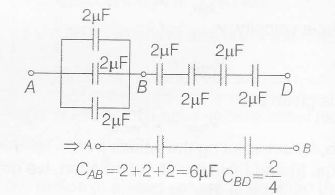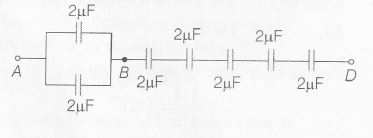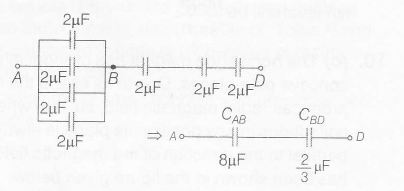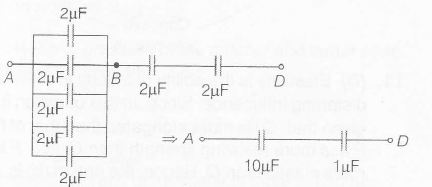Answer:
Option D
Explanation:
Key Idea
For n capacitors i.e, C1, C2,.......Cn their equivalent capacitance , when connected in
(a) series is given as, $\frac{1}{C_{s}}=\frac{1}{C_{1}}+\frac{1}{C_{2}}+....$
and (b) parallel is given as, $C_{p}=C_{1}+C_{2}+....$
In the given problem, we will check the net capacitance in each option and compare it with the desired capacitance mentioned in it.
(a) 3 capacitors are in parallel and 4 capapcitors are connected in series, i.e,

where, CAB is the equivalent capacitance of parallel branches between A and C and CBD is equivalent capacitance of series capacitors between B and D , So , equivalent capacitance
$C_{eq}=\frac{C_{AB}.C_{BD}}{C_{AB}+C_{BD}}=\frac{6\times\frac{2}{4}}{6 +\frac{2}{4}}=\frac{6}{13}\mu F$
Similarly,
(b) 2 capacitors are in parallel and 5 capacitors are connect in series i.e,


So, equivalent capacitance,
$C_{eq}==\frac{4\times\frac{2}{5}}{4 +\frac{2}{5}}=\frac{4}{11}\mu F$
(c) 4 capacitors are in parallel and 3 capacitors are connect in series i.e,

So, equivalent capacitance,
$C_{eq}=\frac{8\times\frac{2}{3}}{8 +\frac{2}{3}}=\frac{16}{26}=\frac{8}{13}\mu F$
(d) 5 capacitors are in parallel and 2 capacitors are connect in series i.e,

So, equivalent capacitance
$C_{eq}=\frac{10\times1}{10 +1}==\frac{10}{11}\mu F$
So, the correct option is (d)